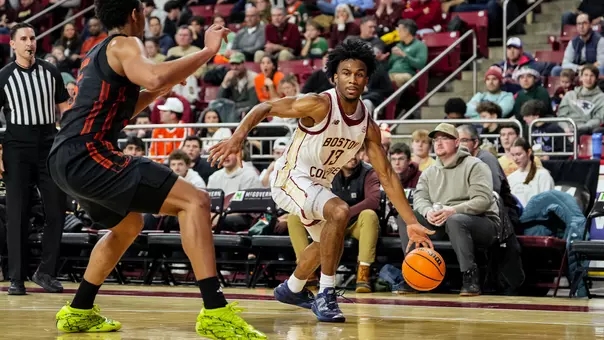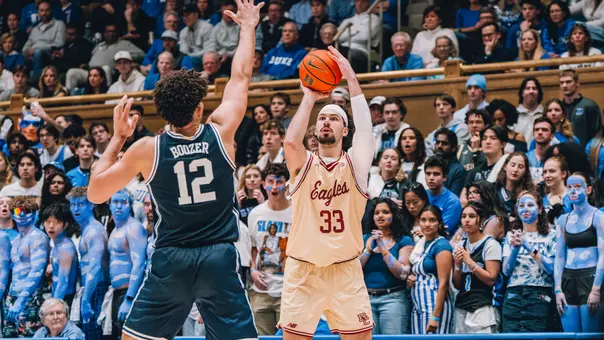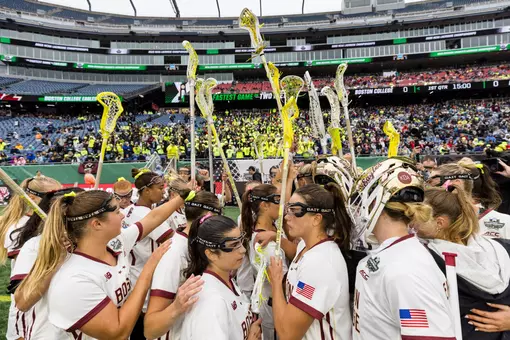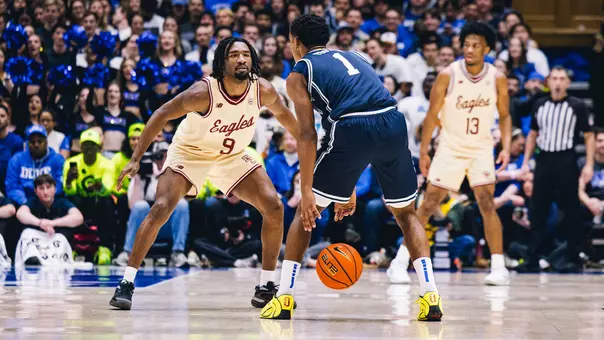Boston College Athletics

Photo by: Eddie Shabomardenly
Eagles Shootaround: Week V
December 20, 2022 | Men's Basketball, #ForBoston Files
A win over Stonehill broke a four-game slide and got the Eagles back in the win column as ACC play looms.
CHESTNUT HILL, Mass. -- It's hard to remember how much talent exists in the basketball world. The sheer number of kids playing the sport reaches into the hundreds of millions, and the explosion stemming from the early-1990s and the original Dream Team impacted a full generation of players who grew up watching their heroes - both domestic and international - succeed in the NBA. It spurred continued growth over the past 30 years to the point where there isn't a corner of the globe where basketball is irrelevant, and the sport is arguably just as big as the crowd that grew up playing soccer.
The United States still owns a special place in that world and the opportunity to play basketball - particularly at the college level - occupies hallowed space within the game's fabric. The NCAA Tournament is America's most popular sporting tournament. The Final Four is historic and more legendary than the NBA Finals in some respects, and each division is littered with hundreds of programs offering incoming college students an opportunity to play basketball while studying for a degree. From even the most simplistic, transitive viewpoint, that means that there are elite basketball players who play at every level of college basketball, even if their recruitment is weighed and measured against their peers.
This week, even the most hardened Boston College supporter understood what that meant when Stonehill, a transitional Division II school located about an hour south of Boston, visited Chestnut Hill for the first time as a Division I program and for 40 minutes before dropping a seven-point decision to the Eagles at Conte Forum.
"I watched Stonehill play Providence," said head coach Earl Grant, "They're pretty good. They have a lot of fifth-year seniors and they have guys who can shoot and have played together for years. I played Division II, so I understand how solid Division II teams present challenges. And that's what we faced. That team was capable and we knew that over the summer when we scheduled this game. I'm just happy we were able to find a way to get the win."
Expecting that team to simply bottom out was almost disrespectful to a program built around capable shooters, and Stonehill proved its worth by scoring 70 or more points in five consecutive games after launching its D-I era against UConn. Stonehill entered Conte Forum averaging over 70 points per game with a three-point shooting percentage just south of 40 percent and that potential to step onto the court and shoot the lights out made them dangerous. The Skyhawks struggled early and watched BC execute an 18-0 run to build a 16-point lead in the first half.
In the second half, the Skyhawks adjusted and avoided shooting the outside shot. They used the threat to create passing lanes into the inside, and they heated up to the tune of a 52 percent field goal percentage from the floor. They looked for a higher efficiency, and as momentum swung, a second half cold snap limited BC's offensive effectiveness. The Eagles still got to the line, but it was a case where the late minutes, sloppy as they looked, allowed BC to muck past a pesky, confident bunch that probably deserved more credit and respect than the initial numbers might have offered.
"In pretty much all of their games, in the first 10 to 12 minutes, they made a barrage of threes," Grant said. "It was almost in every game that I watched - all of the opponents they played, for whatever reason, they made a barrage of in the first 10 minutes. But then you can adjust to who the shooters are and force them to dribble. I thought our guys did a good job of forcing them into trouble."
Regardless of how it happened, BC's win punched the Eagles to a .500 record as non-conference play closed. Owners of a 6-6 record, it's now onto ACC play for the rest of the season. A schedule that began with Duke continues next week with a nationally-ranked Virginia Tech team looking to defend its postseason crown from a year ago
Other observations from a busy week in college basketball:
1) It was a rivalry renewed of sorts
Playing Stonehill brought BC basketball back to an older, lost era that predated even the Big East. It echoed years when 20-win teams weren't considered tournament contenders, and the movement hadn't started that kickstarted Dave Gavitt's dream of forming a powerful basketball league among the gritty northeastern programs.
The Eagles historically played a regional schedule in those days, but games against opponents like Stonehill lacked a formalized path to an NCAA Tournament that only invited 25 teams to its bracket. The National Invitation Tournament, in many respects throughout the Eastern basketball world, was the more prestigious tournament. The 1968-69 season, for example, saw BC win 21 games with an extended 14-game winning streak. The 16th-ranked Eagles and head coach Bob Cousy advanced to the NIT to play Kansas, Louisville and Army before losing the final game to Temple. Five years later, another 21-win BC team played in the NIT, where one-point wins over Cincinnati and Connecticut precede a 117-93 loss to Utah in the semifinals.
An NCAA Tournament expansion to 32 teams in 1975 finally broke the Eagles into the national tournament picture, where they beat Furman before losses to Kansas State in the Regional Semifinals and North Carolina in the East Regional Third Place Game resulted in a fourth place finish, and subsequent expansions of the tournament coincided with both the arrival of the Big East and the reorganization of the NCAA's "College Division" into Division II to push smaller schools like Stonehill off BC's schedule.
Stonehill had never beaten BC, but ending the second era of a matchup that played annually between 1951-58 and again from 1977-84 sent the Chieftains on a path that included six regular season championships and four postseason crowns as part of the Northeast-10 Conference, a league they helped charter. They earned 15 different bids to the Division II national tournament before jumping to the Northeast Conference this year, and the renamed-Skyhawks program more recently advanced to two Final Fours after earning a No. 1 seed in 2006 and a No. 2 seed in 2012. In 2020, Stonehill was the No. 3 seed in the East before the postseason was canceled due to COVID-19.
2) Next stop: March.
Passing Stonehill ended non-conference play for Boston College, and even with an extended break before next week's game against Virginia Tech, a more serious tone took hold in the aftermath of Tuesday's win over the Skyhawks with the realization that ACC play, which had a soft opening against Duke, won't end until the season closes in March..
"We just have to prepare at the highest level that we can," Grant said. "Every game is going to be tough for us at this point, so we have to prepare at the highest level as it pertains to a game plan. I don't think it's so much about Virginia Tech yet because I think it's still about whomever we've played in the rotation and the improvements that we had to make. We had to focus our growth, but as we get closer to that game, we'll start preparing for Virginia Tech. Mike Young's done a great job, and I've known him for 20 years. They have good players that won an ACC championship."
BC unquestionably went through its trials over the first dozen games of the season, but entering ACC play is inherently more difficult than anything from the first three months. Seven of the 15 teams have eight or more wins, and four teams are ranked nationally in the most recent Associated Press poll. Virginia Tech is one of those teams, and the No. 21/20 Hokies had to win their way back into the rankings by going 11-1 in their first dozen games.
It's a similar story as a No. 22 Miami team seeded nine points behind the Hokies, and of the dozen-plus teams in the league, eight are undefeated at home. Duke and Notre Dame are the only two teams yet to play a true road game,. Virginia, which recently left the ranks of the undefeated, dropped from No. 2 to 6 in the national polls.
"This roller coaster that we've been on kind of helped us gel a lot better," said sophomore Jaeden Zackery. "I know we were on a four-game losing streak, so I feel like that brought the guys a lot closer. We had individual meetings with each other just as players without coaches, and I feel like being able to talk to each other and be real with each other might help us gel a lot. It'll help us get going with the ACC."
3) Buried deep within history is some history.
The NCAA named Massachusetts governor Charlie Baker as its next president on Wednesday in a move that signaled the next phase for a two-term elected official who consistently ranked among the country's more popular executives. A Harvard graduate, he never had any formal ties to Boston College, though he hosted the national champion women's lacrosse team following their win in the 2021 NCAA Tournament and his support of the ALS Ice Bucket Challenge and the Frates family never wavered.
Baker's lone season as a varsity letter winner included a footnote that his first points of that year were scored against Boston College in a game held on December 4, 1977. It was the third game of the year for new Eagles head coach Tom Davis, and after splitting the first two against Le Moyne and New Hampshire, the matchup at Harvard loomed as a sneaky important game for a program that lost in Cambridge two years earlier. In the interceding year between the road games, BC and Harvard battled to a four-point Eagles win at the Roberts Center, and it was the second consecutive home game for the Crimson, who lost to Massachusetts in their own season opener three days before playing BC.
The matchup itself was more nondescript, and a box score buried in The Boston Globe the next day told the story of an 84-70 win for the Eagles, but a stat line layered deep in that three-inch piece of space saw Baker score two points against a BC team with three players in double figures. Those were some of the first points of a career that only saw limited minutes in a program coached by Satch Sanders and Frank McLaughlin.
Annual games between BC and Harvard were a casualty of the Big East's creation, and a revival in the late-2000s coincided with the Crimson's rise as an Ivy League power capable of smashing national championship contenders before the teams ceased playing each other after 2016. Memories of that older era, though, still resonate with local basketball fans, and while Governor Baker has long been a supporter of the Commonwealth's college sports infrastructure, it's always interesting to note how Boston College carries a small part of a career that's now paving its way to the NCAA head office.
Layup Line: National picture
Ending the non-conference portion of the schedule allows conferences to reassess where they are in relation to one another in the NCAA Tournament picture, and the ACC, despite its overall success in its non-league success, has five teams in the most recent ESPN Bracketology prediction: Virginia, Duke, Virginia Tech, Miami and North Carolina.
It's hard to gauge how deep the gap runs between those teams, but the first two losses of NC State's season put the Wolfpack in the Next Four Out. No other ACC school is on a radar led by the Big 12's nine bids and the Big Ten's eight bids, numbers that could fluctuate and shift with the early bubble status of Oklahoma, Rutgers and Penn State. Michigan is lingering further behind, but the more volatile status of teams like Florida Atlantic and New Mexico or Boise State - both of which are in the Mountain West Conference - creates a divide that's tenuous at best because the MWC and Conference USA leagues are both considered mid-major.
Any number of losses to lower seeded teams could flatten those leagues' hopes of getting multiple bids, especially since the West Coast Conference is always a factor with Gonzaga, and a conference like the American, which has a nation-leading Houston atop its own bids, could sneak a second or third team into the dance if the season and postseason break appropriately.
The United States still owns a special place in that world and the opportunity to play basketball - particularly at the college level - occupies hallowed space within the game's fabric. The NCAA Tournament is America's most popular sporting tournament. The Final Four is historic and more legendary than the NBA Finals in some respects, and each division is littered with hundreds of programs offering incoming college students an opportunity to play basketball while studying for a degree. From even the most simplistic, transitive viewpoint, that means that there are elite basketball players who play at every level of college basketball, even if their recruitment is weighed and measured against their peers.
This week, even the most hardened Boston College supporter understood what that meant when Stonehill, a transitional Division II school located about an hour south of Boston, visited Chestnut Hill for the first time as a Division I program and for 40 minutes before dropping a seven-point decision to the Eagles at Conte Forum.
"I watched Stonehill play Providence," said head coach Earl Grant, "They're pretty good. They have a lot of fifth-year seniors and they have guys who can shoot and have played together for years. I played Division II, so I understand how solid Division II teams present challenges. And that's what we faced. That team was capable and we knew that over the summer when we scheduled this game. I'm just happy we were able to find a way to get the win."
Expecting that team to simply bottom out was almost disrespectful to a program built around capable shooters, and Stonehill proved its worth by scoring 70 or more points in five consecutive games after launching its D-I era against UConn. Stonehill entered Conte Forum averaging over 70 points per game with a three-point shooting percentage just south of 40 percent and that potential to step onto the court and shoot the lights out made them dangerous. The Skyhawks struggled early and watched BC execute an 18-0 run to build a 16-point lead in the first half.
In the second half, the Skyhawks adjusted and avoided shooting the outside shot. They used the threat to create passing lanes into the inside, and they heated up to the tune of a 52 percent field goal percentage from the floor. They looked for a higher efficiency, and as momentum swung, a second half cold snap limited BC's offensive effectiveness. The Eagles still got to the line, but it was a case where the late minutes, sloppy as they looked, allowed BC to muck past a pesky, confident bunch that probably deserved more credit and respect than the initial numbers might have offered.
"In pretty much all of their games, in the first 10 to 12 minutes, they made a barrage of threes," Grant said. "It was almost in every game that I watched - all of the opponents they played, for whatever reason, they made a barrage of in the first 10 minutes. But then you can adjust to who the shooters are and force them to dribble. I thought our guys did a good job of forcing them into trouble."
Regardless of how it happened, BC's win punched the Eagles to a .500 record as non-conference play closed. Owners of a 6-6 record, it's now onto ACC play for the rest of the season. A schedule that began with Duke continues next week with a nationally-ranked Virginia Tech team looking to defend its postseason crown from a year ago
Other observations from a busy week in college basketball:
1) It was a rivalry renewed of sorts
Playing Stonehill brought BC basketball back to an older, lost era that predated even the Big East. It echoed years when 20-win teams weren't considered tournament contenders, and the movement hadn't started that kickstarted Dave Gavitt's dream of forming a powerful basketball league among the gritty northeastern programs.
The Eagles historically played a regional schedule in those days, but games against opponents like Stonehill lacked a formalized path to an NCAA Tournament that only invited 25 teams to its bracket. The National Invitation Tournament, in many respects throughout the Eastern basketball world, was the more prestigious tournament. The 1968-69 season, for example, saw BC win 21 games with an extended 14-game winning streak. The 16th-ranked Eagles and head coach Bob Cousy advanced to the NIT to play Kansas, Louisville and Army before losing the final game to Temple. Five years later, another 21-win BC team played in the NIT, where one-point wins over Cincinnati and Connecticut precede a 117-93 loss to Utah in the semifinals.
An NCAA Tournament expansion to 32 teams in 1975 finally broke the Eagles into the national tournament picture, where they beat Furman before losses to Kansas State in the Regional Semifinals and North Carolina in the East Regional Third Place Game resulted in a fourth place finish, and subsequent expansions of the tournament coincided with both the arrival of the Big East and the reorganization of the NCAA's "College Division" into Division II to push smaller schools like Stonehill off BC's schedule.
Stonehill had never beaten BC, but ending the second era of a matchup that played annually between 1951-58 and again from 1977-84 sent the Chieftains on a path that included six regular season championships and four postseason crowns as part of the Northeast-10 Conference, a league they helped charter. They earned 15 different bids to the Division II national tournament before jumping to the Northeast Conference this year, and the renamed-Skyhawks program more recently advanced to two Final Fours after earning a No. 1 seed in 2006 and a No. 2 seed in 2012. In 2020, Stonehill was the No. 3 seed in the East before the postseason was canceled due to COVID-19.
2) Next stop: March.
Passing Stonehill ended non-conference play for Boston College, and even with an extended break before next week's game against Virginia Tech, a more serious tone took hold in the aftermath of Tuesday's win over the Skyhawks with the realization that ACC play, which had a soft opening against Duke, won't end until the season closes in March..
"We just have to prepare at the highest level that we can," Grant said. "Every game is going to be tough for us at this point, so we have to prepare at the highest level as it pertains to a game plan. I don't think it's so much about Virginia Tech yet because I think it's still about whomever we've played in the rotation and the improvements that we had to make. We had to focus our growth, but as we get closer to that game, we'll start preparing for Virginia Tech. Mike Young's done a great job, and I've known him for 20 years. They have good players that won an ACC championship."
BC unquestionably went through its trials over the first dozen games of the season, but entering ACC play is inherently more difficult than anything from the first three months. Seven of the 15 teams have eight or more wins, and four teams are ranked nationally in the most recent Associated Press poll. Virginia Tech is one of those teams, and the No. 21/20 Hokies had to win their way back into the rankings by going 11-1 in their first dozen games.
It's a similar story as a No. 22 Miami team seeded nine points behind the Hokies, and of the dozen-plus teams in the league, eight are undefeated at home. Duke and Notre Dame are the only two teams yet to play a true road game,. Virginia, which recently left the ranks of the undefeated, dropped from No. 2 to 6 in the national polls.
"This roller coaster that we've been on kind of helped us gel a lot better," said sophomore Jaeden Zackery. "I know we were on a four-game losing streak, so I feel like that brought the guys a lot closer. We had individual meetings with each other just as players without coaches, and I feel like being able to talk to each other and be real with each other might help us gel a lot. It'll help us get going with the ACC."
3) Buried deep within history is some history.
The NCAA named Massachusetts governor Charlie Baker as its next president on Wednesday in a move that signaled the next phase for a two-term elected official who consistently ranked among the country's more popular executives. A Harvard graduate, he never had any formal ties to Boston College, though he hosted the national champion women's lacrosse team following their win in the 2021 NCAA Tournament and his support of the ALS Ice Bucket Challenge and the Frates family never wavered.
Baker's lone season as a varsity letter winner included a footnote that his first points of that year were scored against Boston College in a game held on December 4, 1977. It was the third game of the year for new Eagles head coach Tom Davis, and after splitting the first two against Le Moyne and New Hampshire, the matchup at Harvard loomed as a sneaky important game for a program that lost in Cambridge two years earlier. In the interceding year between the road games, BC and Harvard battled to a four-point Eagles win at the Roberts Center, and it was the second consecutive home game for the Crimson, who lost to Massachusetts in their own season opener three days before playing BC.
The matchup itself was more nondescript, and a box score buried in The Boston Globe the next day told the story of an 84-70 win for the Eagles, but a stat line layered deep in that three-inch piece of space saw Baker score two points against a BC team with three players in double figures. Those were some of the first points of a career that only saw limited minutes in a program coached by Satch Sanders and Frank McLaughlin.
Annual games between BC and Harvard were a casualty of the Big East's creation, and a revival in the late-2000s coincided with the Crimson's rise as an Ivy League power capable of smashing national championship contenders before the teams ceased playing each other after 2016. Memories of that older era, though, still resonate with local basketball fans, and while Governor Baker has long been a supporter of the Commonwealth's college sports infrastructure, it's always interesting to note how Boston College carries a small part of a career that's now paving its way to the NCAA head office.
Layup Line: National picture
Ending the non-conference portion of the schedule allows conferences to reassess where they are in relation to one another in the NCAA Tournament picture, and the ACC, despite its overall success in its non-league success, has five teams in the most recent ESPN Bracketology prediction: Virginia, Duke, Virginia Tech, Miami and North Carolina.
It's hard to gauge how deep the gap runs between those teams, but the first two losses of NC State's season put the Wolfpack in the Next Four Out. No other ACC school is on a radar led by the Big 12's nine bids and the Big Ten's eight bids, numbers that could fluctuate and shift with the early bubble status of Oklahoma, Rutgers and Penn State. Michigan is lingering further behind, but the more volatile status of teams like Florida Atlantic and New Mexico or Boise State - both of which are in the Mountain West Conference - creates a divide that's tenuous at best because the MWC and Conference USA leagues are both considered mid-major.
Any number of losses to lower seeded teams could flatten those leagues' hopes of getting multiple bids, especially since the West Coast Conference is always a factor with Gonzaga, and a conference like the American, which has a nation-leading Houston atop its own bids, could sneak a second or third team into the dance if the season and postseason break appropriately.
Players Mentioned
Men's Basketball: Miami Postgame Press Conference (Feb. 7, 2026)
Saturday, February 07
Men’s Hockey: Vermont Press Conference (Head Coach Greg Brown - Feb. 6, 2026)
Saturday, February 07
Lacrosse Season Preview with Brooke McLoy
Friday, February 06
Eagles vs Wildcats: 2026 Lacrosse Season Preview
Friday, February 06



















